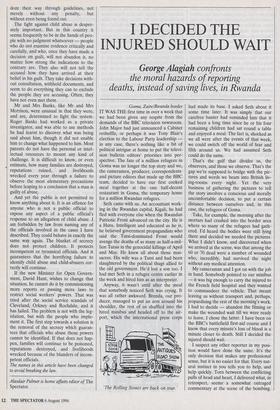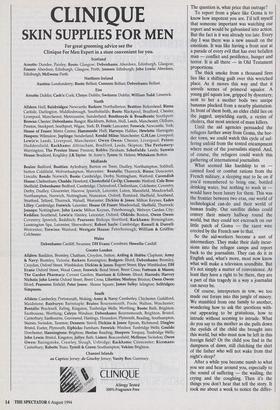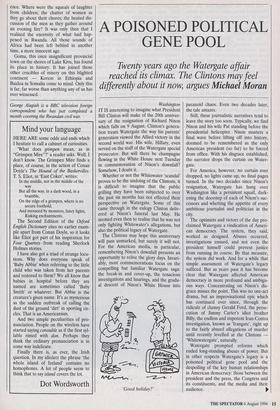I DECIDED THE INJURED SHOULD WAIT
George Alagiah confronts
the moral hazards of reporting deaths, instead of saving lives, in Rwanda
Goma, ZairelRwanda border IT WAS THE first time in over a week that we had been given any respite from the demands of the BBC television newsroom. John Major had just announced a Cabinet reshuffle, or perhaps it was Tony Blair's election to the Labour Party leadership in any case, there's nothing like a bit of political intrigue at home to put the televi- sion bulletin editors' priorities into per- spective. The fate of a million refugees in Goma was no longer the top story and we, the cameramen, producer, correspondents and picture editors that made up the BBC team, decided to have our first cooked meal together at the one half-decent restaurant in Goma, the temporary home for a million Rwandan refugees.
Seth came with us. An accountant work- ing in the Rwandan capital, Kigali, he had fled with everyone else when the Rwandan Patriotic Front advanced on the city. He is a Hutu. Intelligent and educated as he ,is, he believed government propagandists who said the Tutsi-dominated Front would avenge the deaths of as many as half-a-mil- lion Tutsis in the genocidal killings of April and May. He knew all about those mas- sacres. His wife was a Tutsi and had been slaughtered by the political thugs allied to the old government. He'd lost a son too. I had met Seth in a refugee centre earlier in the week and hired him as an interpreter.
Anyway, it wasn't until after the meal that somebody noticed Seth was crying. It was all rather awkward. Brenda, our pro- ducer, managed to put an arm around his shoulder, the rest of us shuffled into the hired minibus and headed off to the air- port, which the international press corps The Rolling Stones are back on tour.' had made its base. I asked Seth about it some time later. It was simply that our carefree banter had reminded him that it had been a long time since he or his four remaining children had sat round a table and enjoyed a meal. The fact is, shocked as we all were after the events of that week, we could switch off the world of fear and filth around us. We had assumed Seth could do the same.
That's the gulf that divides us, the observers, and those we observe. That's the gap we're supposed to bridge with the pic- tures and words we beam into British liv- ing-rooms every night. Yet the very business of gathering the pictures to tell the story involves a conscious and morally uncomfortable decision, to put a certain distance between ourselves and, in this case, the refugees of Goma.
Take, for example, the morning after the mortars had crashed into the border area where so many of the refugees had gath- ered. I'd heard the bodies were still lying there and decided we needed the pictures. What I didn't know, and discovered when we arrived at the scene, was that among the 60 or 70 dead were a number of wounded who, incredibly, had survived the night without any medical attention.
My cameraman and I got on with the job in hand. Somebody pointed to our minibus — it was big enough to carry the injured to the French field hospital and they wanted to commandeer the vehicle. That meant leaving us without transport and, perhaps, jeopardising the rest of the morning's work. I had to decide — abandon the filming or make the wounded wait till we were ready to leave. I chose the latter. I have been on the BBC's battlefield first-aid course and I know that every minute's loss of blood is a minute closer to death. Still I decided the injured should wait.
I suspect any other reporter in my posi- tion would have done the same. It's the only decision that makes any professional sense, but it is no easier for that. Every nat- ural instinct in you tells you to help, and help quickly. Torn between the conflicting pulls of head and heart, I delivered what, in retrospect, seems' a somewhat outraged commentary at the scene of the bombing. The question is, what price that outrage?
To report from a place like Goma is to know how impotent you are. I'd tell myself that someone important was watching our report and would be galvanised into action. But the fact is it was already too late. Every day I was there was a new assault on the emotions. It was like having a front seat at a parade of every evil that has ever befallen man — conflict and pestilence, hunger and terror. It is all there — in Old Testament proportions.
The thick smoke from a thousand fires lies like a shifting guilt over this wretched place. As it moves this way and that it unveils scenes of primeval squalor. A young girl squats low, gripped by dysentery; next to her a mother boils two unripe bananas plucked from a nearby plantation. In front of them both, an elder child lies on the jagged, unyielding earth, a victim of cholera, that most ancient of mass killers.
Until the aid agencies persuaded the refugees further away from Goma, the bor- der town, we could watch this cycle of suf- fering unfold from the tented encampment where most of the journalists stayed. And, of course, the refugees could watch this gathering of international journalists.
What seemed like hardship to us canned food or combat rations from the French military, a sleeping mat to lie on if you'd remembered to bring one, bottled drinking water, but nothing to wash in would have been luxury for them. This was the frontier between two eras, our world of technological can-do and their world of human frailty. Our satellite dishes could convey their misery halfway round the world, but they could not encroach on our little patch of Goma — the razor wire erected by the French saw to that.
So the aid-workers become a sort of intermediary. They make their daily incur- sions into the refugee camps and report back to the journalists. They can do it in English and, what's more, most now know what will make a television soundbite. But it's not simply a matter of convenience. At least they have a right to be there, they are a part of this tragedy in a way a journalist can never be.
Of course, interpreters in tow, we too made our forays into this jungle of misery. We stumbled from one family to another, wondering how to ask the questions with- out appearing to be gratuitous, how to intrude without seeming to intrude. What do you say to the mother as she pulls down the eyelids of the child she brought into this world, but who must now be left in this foreign field? Or the child you find in the dampness of dawn, still clutching the shirt of the father who will not wake from that night's sleep?
After a while you become numb to what you see and hear around you, especially to the sound of suffering — the wailing, the crying and the coughing. Then it's the things you don't hear that tell the story. It took me about a week to notice the differ- ence. Where were the squeals of laughter from children; the chatter of women as they go about their chores; the heated dis- cussion of the men as they gather around an evening fire? It was only then that I realised the enormity of what had hap- pened in Rwanda. All those sounds of Africa had been left behind in another time, a more innocent age.
Goma, this once insignificant provincial town on the shores of Lake Kivu, has found its place in history. It has joined those other crucibles of misery on this blighted continent — Korem in Ethiopia and Baidoa in Somalia come to mind. Only this is far, far worse than anything any of us has ever witnessed.
George Alagiah is a BBC television foreign correspondent who has just completed a month covering the Rwandan civil war.




















































 Previous page
Previous page